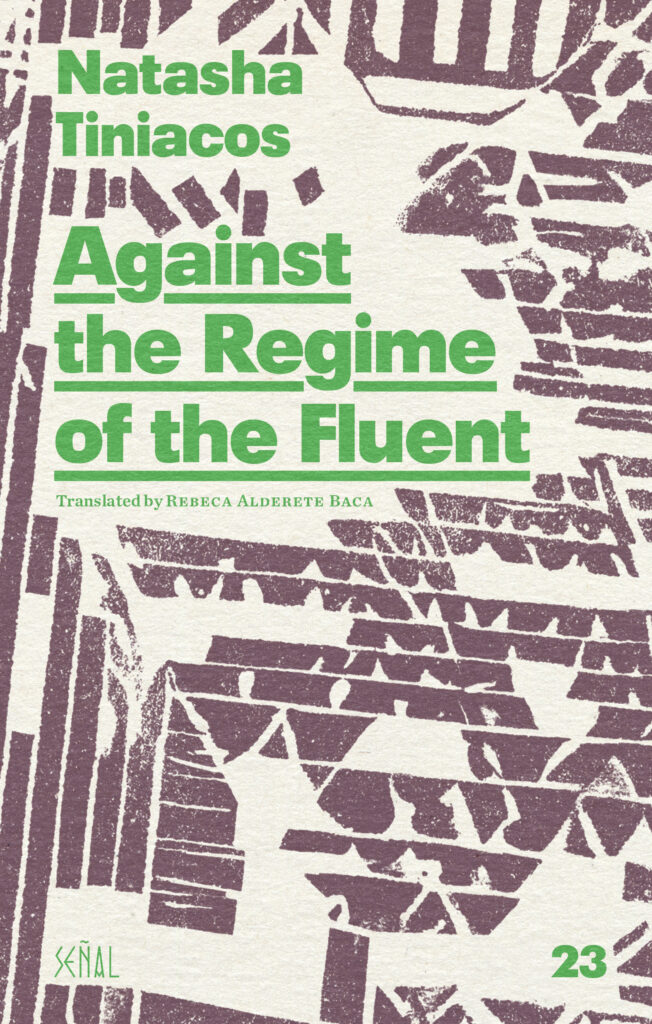How long can you hold your breath and follow a string to the bottom of a waterfall? Contra el régimen de lo fluido asks how you would fall knowing you must resist. These poems are mnemonic screenshots of the author’s request for affirmative asylum to relieve the individual’s fear of repercussions in her home country, fragments that dream of becoming ruins of a present still unfolding against the systems of power, (the) body, language or all the systems.

Against the Regime of the Fluent
Natasha Tiniacos
Translated by Rebeca Alderete Baca
November 2024
About the Author
Natasha Tiniacos is a poet, literary translator, and scholar from Maracaibo, Venezuela, living in the U.S. after being granted political asylum. She is the author of Historia privada de un etcétera (Libros del fuego), Mujer a fuego lento (Equinoccio) as well as the Spanish translator of Gabriel Dozal’s The Border Simulator. Her poetry and translations can be found in The Baffler and Fence. She has received fellowships from the Lower Manhattan Cultural Council, and the U.S. Department of State Office of Cultural Affairs. She has worked as a poet in residence in Campo Air (Uruguay), the International Writing Program of the University of Iowa, and Vermont Studio Center. She holds an MFA from New York University and is a Ph.D. candidate at The Graduate Center.
Praise
In this lengthy poem by Natasha Tiniacos, words permanently migrate and mutate. They morph from sense to sound, are broken and then recreated and reshaped, somehow mirroring her own experience when leaving her mother land -and mother tongue- to reinvent herself in the new landscape. All the senses are alert in this movable experience: sound ear eye smell tact. To extend a hand and touch another human being is the only act that humanizes us, the poet seems to tell us; to touch and remold words, like the committed wordsmith she is, makes Natasha Tiniacos’ work an urgent document against constraint. Her powerful discourse brings down any symbolic or real prison of the “I”. Liberated and liberating, these words flow and nothing can shut down this strong voice from rising [a]gainst the regime of no/ against the regime of grief/ against the regime of (the) body, loud and clear, brilliantly.
Mariela Dreyfus
Natasha Tiniacos’s writing consists of a tight knitting of words that refer to a gamut of sensations, ideas, objects; such a knitting is the only possible way to approach the solidity, the concreteness of the experience she wants to incarnate in her poems. Hence, the disparity of registers, the sudden changes of tone, the unruly grammar that at times takes possession of her language. Hunger, touch, deprivation, mother, longing, love, body, house, immersion, solitude, image, remembrance, are sewn in these texts through a subtle, almost invisible thread that forces us readers, in a constant challenge to intelligibility, to move back and forth between the tangibility of things and the ineffability of passion, of suffering, of homelessness, preventing us from settling for the 'narrative,' the 'story' in order to remain in the tense space of words that neither explain nor trivialize their complex interrelation. Against both the 'regime of the body' and the 'regime of the fluent,' Tiniacos’s poetry is a singular example of writing itself becoming (the) experience.
Luis Miguel Isava
'If we are made of dust, / it is the dust that is left after the stampede.' I feel unshaped by these lines in a way I would like to remember for a long time. In the spirit of being direct, like many of these poems are, this collection and their colloquial translations shattered me, I who did not know I was glass. This book is for the soft animal inside, the one who grieves and the one who survives.
Lara Mimosa Montes
About the Translator
Rebeca Alderete Baca is a poet, editor and translator from Albuquerque, New Mexico. Baca’s translation work allows for slippages, opacities and spaces. Find her work in Black Warrior Review, Rainbow Agate and on road signs on Central Avenue east of Washington Street in Albuquerque.
In the News
Publication Details
ISBN: 978-1-946604-22-4
Chapbook
48 pp, 5.25 x 8.25 in
Publication Date: November 15 2024
Distribution: Asterism Books (US)
Series: Señal #23